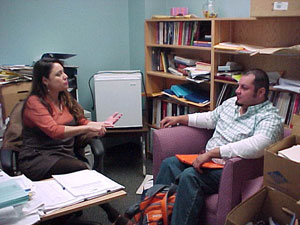
Photo by Candace Aum
Understanding and using campus advisers and counselors can be important factors in achieving your dreams.
Palo Alto College faculty and staff professionals are readily available to help you develop, adapt and implement your plan for success.
Advising is good thing, regardless of age, said Nell Gruben, Palo Alto sophomore. “It saves you time, money and effort.”
A non-traditional student, Gruben transferred to Palo Alto College in the summer of 2005 after attending Northwest Vista College and completing six credit hours. She worked full-time at Northside Independent School District, wanted better job security and yearned to make the most of her time in earning her associate’s degree.
Gruben needed and wanted a plan to attain her goals without wasting any steps. She found that important plan, and more, when she teamed up with her faculty adviser, Dr. Amie DeLeon, Instructor of Teacher Education. Gruben learned all of the degree’s requirements, what she needed to do and how to go about doing it. If challenges occurred along the way, her adviser was there for her.
In May of this year, Gruben will complete both her Associate’s of Applied Science in Educational Aide and her Educational Aide Certificate. She will transfer to Texas A&M-Kingsville here in San Antonio.
“Students having an educational plan and knowing how to plan” are more successful, according to Dr. Stacey Johnson, Interim Vice President for Academic Affairs.
“Getting advised early is essential,” said Dr. Cynthia Mendiola-Perez, Director of Advising and Student Support Services. “Engagement with an adviser really increases the success rate.”
Anthony Pierulla, counselor and assistant professor, teaches SDEV to help students make informed decisions and become an active participant.
He wants his students to develop the habit of asking questions and seeking out credible information. As a licensed counselor, he and his colleagues also provide assistance when students are faced with challenges, like grief, anxiety, loss and depression.
Mendiola-Perez explained that licensed counselors and faculty advisers work together as a team to help students develop a plan. The model she uses to promote a culture of advising on campus helps and enhances this team effort.
As students, you know what your goals are, but you may not know exactly how to accomplish them.
If you are planning to go for your bachelor’s degree, knowing in advance what courses are needed can be most beneficial to make sure all your hard-earned hours transfer. If you are pursuing a certificate, you also need to know the requirements.
Faculty advising is essential for all students, according to Elizabeth Tanner, Interim Arts, Humanities and Social Sciences Dean. One of her concerns is how to keep advising alive as students pursue their goals, not just by requiring it but by making sure students understand its importance and take advantage of the free guidance.
Faculty advisers are not only professors and instructors, they are also qualified professionals in their own fields, have working experience, and are up-to-date on how degree plans apply in the work force. Advisers provide first-hand advice and critical information—what the profession is like, what you should be prepared for and what challenges lay ahead.
For students who have declared a major, you probably already know about the benefits of academic advising. For those who are undeclared, you may seek out advisement, as well. The Spring/Maymester 2008 Bulletin “encourages currently enrolled students with 30 and 50 completed hours to seek advisement” as part of the "Be Advised! Campaign".
Finding an adviser or counselor is easy. Look for the grey posters displayed around the campus or go to the Palo Alto website. Click on Academics and then on Welcome Enrollment Center. At the bottom, you will be able to select between faculty advisers and counselors.
Developing a rapport with your faculty adviser is like having your own personal academic fitness coach on campus, similar to a “life coach” in Mendiola-Perez’s words.
Taking advantage of what faculty advisers can do for you does not cost you a thing, only time and effort on your part. The advisers welcome sharing their education and experience so that you will be successful. They are anxious and ready to help you.
Knowing the roles and capabilities of counselors and advisers is important, but learning to use them is even more important to ensure your success, not only at Palo Alto but in your future endeavors.